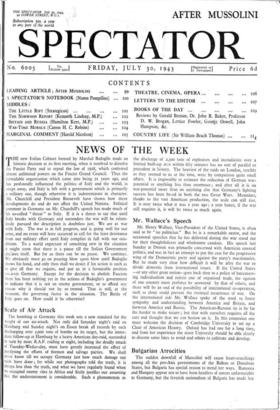Mr. Wallace's Speech
Mr. Henry Wallace, Vice-President of the United States, is often said to be "no politician." But he is a remarkable orator, and the occasional speeches that he has delivered during the war stand out for their thoughtfulness and wholesome candour. His speech hit Sunday at Detroit was primarily concerned with American internal politics, and was in fact an attempt to put the case for the progressive wing of the Democratic party and against the party's reactionaries. But he made very clear how difficult it will be after the war to divide domestic from international issues. If the United States —or any other great nation—goes back then to a policy of buccaneer- ing individualism and rejects one of organised trade, the egoism of one country must perforce be answered by that of others, and there 'will be an end of the -possibility of international co-operation, such as alone could prevent the eventual recurrence of war. On -the international side Mr. Wallace spoke of the need to foster sympathy and understanding between America and Britain, and between America and Russia. The American-Russian tie is by far the -harder to make secure ; but that with ourselves requires all the care and thought that we can bestow on it. In this connexion one must welcome the decision of Cambridge University to set up a Chair of American History. Oxford has had one for a long time, and from her experience the sister University should be able clearly to discern some lines to avoid and others to cultivate and develop.






















